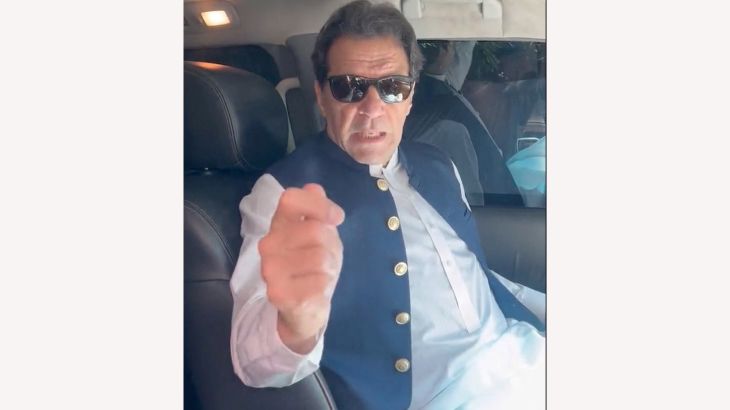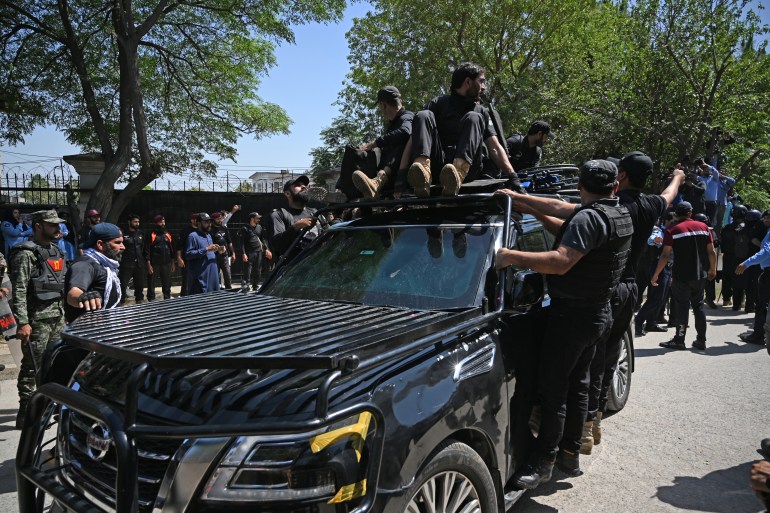Former Pakistani PM Imran Khan arrested at Islamabad court
Protests after former prime minister is arrested over corruption allegations during court appearance in the capital.

Islamabad, Pakistan – Former Pakistani Prime Minister Imran Khan has been arrested as he appeared in a court in the capital, Islamabad, to face corruption allegations, sparking protests across the country.
The arrest on Tuesday is the latest twist in a months-long political crisis and follows several unsuccessful attempts to apprehend the cricketer-turned-politician, including a police raid in March at his residence in the eastern city of Lahore which he had managed to evade.
Keep reading
list of 3 itemsPakistan government, Imran Khan’s PTI agree on simultaneous polls
Imran Khan Q&A: ‘Pakistan civil-military imbalance has to change’
Musarrat Jamshed Cheema, a leader of Khan’s Pakistan Tehreek-e-Insaf (PTI) party, confirmed the arrest on Tuesday to Al Jazeera.
“He went for his biometrics procedure from where he was picked by the Rangers,” she said, referring to the paramilitary force.
As news broke out, PTI supporters took to the streets of several cities demanding the release of the party leader, chanting slogans such as “Khan is out red line.”
Video footage shared on social media showed angry crowds inside the private residence of the corps commander of Lahore, the capital of eastern province of Punjab and the city where Khan resides. Internet monitoring group Netblocks said later on Tuesday access to Twitter, Facebook and YouTube had been restricted.

Akbar Nasir Khan, a top police official in Islamabad, told Al Jazeera that Khan was arrested in a case related to the Al-Qadir University Trust. The anti-corruption National Accountability Bureau (NAB) had issued an arrest warrant against Khan on May 1 in relation to the case, he said.
The accountability body issued a statement saying Khan had been arrested “for the crime of corruption”.
“The former prime minister has not given any adequate response to the summoning notices of NAB. His arrest has been made in accordance with the NAB ordinance and the law,” the statement read.
Since his removal from power last year, Khan has been slapped with dozens of charges, all of which he has denied and said were politically motivated.
Imran Khan’s lawyer accused the Rangers of hitting Khan on his head and kicking him before taking him away.
“Rangers forcibly entered and broke the door and window [of the room]. They picked up Imran Khan from his wheelchair, hit him on his head and kicked him,” Gohar Ali Khan, who was accompanying the former prime minister at the Islamabad High Court, said in a video posted on the PTI’s social media account.
“I fell during the commotion. Rangers pepper sprayed him and took him away,” the lawyer added.
Ali Khan said no police officials were present inside the room where Khan was arrested.
Fawad Chaudhry, a PTI leader, tweeted that the Islamabad High Court complex was “occupied” by the Rangers and lawyers were “being subjected to torture”.
Video footage on local media showed Khan being escorted to a Rangers vehicle and taken to the NAB’s office in Rawalpindi, a town adjoining Islamabad.
Rangers abducted PTI Chairman Imran Khan, these are the visuals. Pakistan’s brave people must come out and defend their country. pic.twitter.com/hJwG42hsE4
— PTI (@PTIofficial) May 9, 2023
PTI officials called on supporters to take to the streets following Khan’s arrest, which they termed an abduction.
“Pakistan’s brave people must come out and defend their country,” the party posted on Twitter.
Police, however, warned that an order banning gatherings of more than four people would be strictly enforced.
Tensions running high
Khan, 70, was removed from power in April 2022 after he lost a confidence vote in parliament. Since then, he has been campaigning for early national polls, due in October this year.
Khan’s arrest followed a recent escalation in a war of words with the country’s powerful military.
The former prime minister has accused a senior military official, Major General Faisal Naseer, who is currently deployed at Inter-Services Intelligence (ISI), Pakistan’s top spy agency, of involvement in an assassination attempt against him in Wazirabad in November 2022. In recent days, he singled him out again for cracking down against his party.
The military on Monday issued a harshly worded statement, terming the accusations of its involvement in last year’s shooting “highly irresponsible and baseless”.
“We ask the political leader concerned to make a recourse to legal avenues and stop making false allegations,” the statement said.
Khan, however, doubled down on the allegations in a video message he released early on Tuesday, before leaving Lahore for Islamabad to attend a court hearing in a separate case.
“This man [Major General Faisal Naseer] tried to kill me twice and whenever an investigation is carried out, I will prove that it was this man and there is a whole gang with him,” the PTI chief said.
A military official, speaking to Al Jazeera on the condition of anonymity, said Tuesday’s arrest “was made after a warrant was issued by the accountability body”.
“They fulfilled their due procedure, and it has absolutely nothing to do with us,” the official said.
The case against Khan
The Al-Qadir Trust case against Khan was initiated last year by the current government of Prime Minister Shehbaz Sharif.
The corruption case pertains to the acquisition of land for Al-Qadir Trust, of which Khan and his wife Bushra Bibi are trustees.
The land, which is worth billions of rupees, was given by Malik Riaz, one of Pakistan’s largest business tycoons, for the launch of an educational institute.
In December 2019, Riaz agreed to hand over assets, including properties, worth $239m to United Kingdom’s National Crime Agency.
Interior Minister Rana Sanaullah told reporters in a news conference on Tuesday that UK authorities had returned 190 million pounds ($239m) to Pakistan in an investigation related to “dirty money”, which Khan then returned to the businessman instead of keeping it in the national exchequer.
The former prime minister has denied wrongdoing.
Khan, who was in power from August 2018 to April 2022, faced criticism in the past from his rivals of being a pawn of the military establishment, which is often considered the kingmaker in the country.
The military has directly ruled the country for more than three decades in its 75 years of existence and is still believed to play an active role in political affairs.